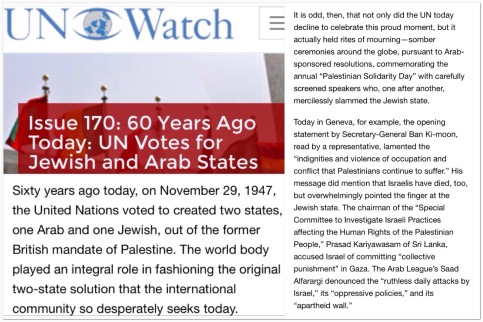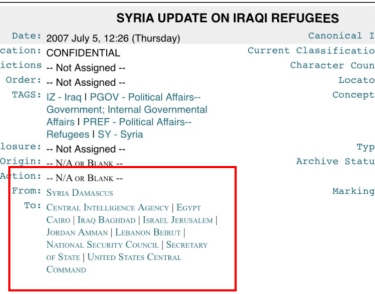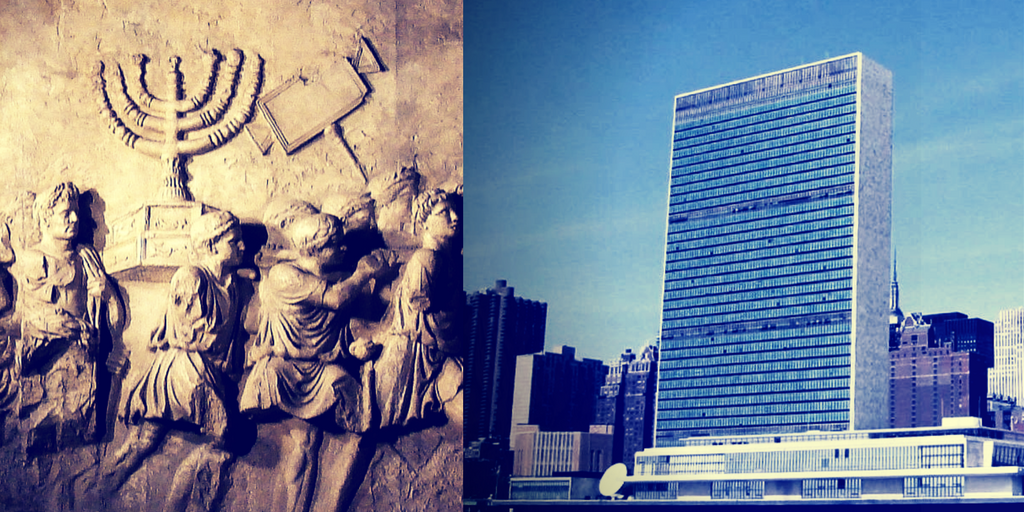As the New York Times dotes on the latest Israel basher, Rachel Kushner, we have to wonder if she and any of the authors writing about the plight of the Palestinian refugees even care that they’ve been pointing their fingers of blame in the wrong direction this whole time. Would they be interested in writing the same stories if they had to tell the world that it was the Arabs — and not the Jews — who leave the Palestinians to languish in refugee camps? That Rachel Kushner’s orphans have been set-up as the “armaments of … Arab nationalism” by the real perpetrators of this atrocity?
As the world turns its back on Israel at the U.N., do people even want to know that those running the show are the same who never wanted a peace settlement with Israel in the first place? Do they want to know their beloved Democrats are the ones who shook hands their hands and pushed the buttons in their ornate chambers … and thus set the plan in motion to throw Israel right under the bus? That all of John Kerry’s holier-than-thou rants about the settlements as the obstacles to peace are just a huge smokescreen? Or is it just easier for everyone to turn their backs on truth … and put the world’s oldest scapegoat story back on repeat?
“The Israeli government systematically resettled all its refugees as part of its national-home policy. The Arab governments, with the assistance of the UN, kept the Arab refugees in camps …”

“Once the UN partition vote was taken the Arabs were bent on destroying all the Jewish settlements and began to attack them immediately. Azzam Pasha, secretary-general of the Arab League, said on the radio: ‘This will be a war of extermination and a momentous massacre.’”
“The Jewish commanders were confident but their resources were small … By March 1948 over 1,200 Jews had been killed, half of them civilians, in Arab attacks … early in April Ben Gurion took what was probably the most difficult decision in his life. He ordered the Haganah on to the offensive to link up the various Jewish enclaves and to consolidate as much as possible of the territory allotted to Israel under the UN plan. The gamble came off almost completely … They established the core of the state of Israel and in effect won the war before it started.” (A History of the Jews, Paul Johnson)

“Ben Gurion read out the Scroll of Independence on Friday 14 May in the Tel Aviv museum. ‘By virtue of our national and intrinsic right,’ he “said, ‘and on the strength of the resolution of the United Nations General Assembly, we hereby declare the establishment of a Jewish state … Egyptian air raids began that night. The next day, simultaneously, the last British left and the Arab armies invaded. They made little difference, except in one respect. King Abdullah’s Arab Legion took the Old City of Jerusalem for him … By the close of the year the Israeli army was 100,000-strong, and properly equipped. It had established a military paramountcy in the area it has never since lost. Armistice talks were opened in Rhodes on 12 January 1949 and were signed with Egypt (14 February), Lebanon (23 March), Transjordan (3 April) and Syria (20 July). Iraq made no agreement at all, and the five Arab states remained in a formal state of war with Israel.” (continued from A History of the Jews, Paul Johnson)

“The events of 1947-8, which established Israel, also created the Arab-Israeli problem, which endures to this day. It has two main aspects, refugees and frontiers … According to UN figures, 656,000 Arab inhabitants of mandatory Palestine fled from Israeli-held territory … They left for four reasons: to avoid being killed in the fighting, because the administration had broken down, because they were ordered to or misled or panicked by Arab radio broadcasts, and because they were stampeded by an Irgun-Stern Gang massacre at the village of Deir Yassin on 9 April 1948 …”
“From 1920 until this point, the Jews had refrained from terrorist attacks on Arab settlements, though the innumerable Arab ones had sometimes provoked heavy-handed reprisals. When the fighting began in the winter of 1947-8, Deir Yassin, an Arab quarrying village of less than 1,000 people, made a non-aggression pact with the nearby Jerusalem suburb of Givat Shaul. But two Jewish settlements nearby were overrun and destroyed, and the Jewish desire for revenge was strong. The Stern Gang proposed to destroy Deir Yassin to teach the Arabs a lesson. A senior Irgun officer Yehuda Lapidot, testified: ‘The clear aim was to break Arab morale and raise the morale of the Jewish community in Jerusalem, which had been hit hard time after time, especially recently by the desecration of Jewish bodies which fell into Arab hands.’ Begin agreed to the operation but said a loudspeaker van must be used to give the villagers a chance to surrender without bloodshed …”
“The Syrian government is reluctant to vet large international organizations for work in Syria, suspecting that they are serving as conduits for spies from ‘Zionist organizations’…”

“It was at this point that the raiding force moved into the village and went out of control … News of this atrocity, in exaggerated form, spread quickly and undoubtedly persuaded many Arabs to flee over the next two months. There is no evidence that it was designed to have this effect. But in conjunction with the other factors it reduced the Arab population of the new state to a mere 160,000. That was very convenient.” (continued from A History of the Jews, Paul Johnson)
“… they did not want the refugees resettled because it meant the final disposal of a moral asset. As Cairo Radio put it: ‘The refugees are the cornerstone in the Arab struggle against Israel. The refugees are the armaments of the Arabs and Arab nationalism.’”

“On the other hand, there were the Jews encouraged or forced to flee from Arab states where, in some cases, Jewish communities had existed for 2,500 years. In 1945 there were over 500,000 Jews living in the Arab world. Between the outbreak of the war on 15 May 1948 and the end of 1967, the vast majority had to take refuge in Israel: 252,642 from Morocco, 13,118 from Algeria, 46,255 from Tunisia, 34,265 from Libya, 37,867 from Egypt, 4,000 from Lebanon, 4,500 from Syria, 3,912 from Aden, 124,647 from Iraq and 46,447 from the Yemen. With a total of 567,654, Jewish refugees from Arab countries were thus not substantially smaller in number than Arab refugees from Israel. The difference in their reception and treatment was entirely a matter of policy. The Israeli government systematically resettled all its refugees as part of its national-home policy. The Arab governments, with the assistance of the UN, kept the Arab refugees in camps, pending a reconquest of Palestine which never came. Hence, as a result of natural increase, there were more Arab refugees in the late 1980s than there had been forty years before.”
“This contrasting attitude towards refugees itself sprang from a fundamentally different approach towards negotiations. The Jews had been for two millennia an oppressed minority who had never possessed the option of force. They had therefore been habitually obliged to negotiate, often for bare existence, and nearly always from a position of great weakness. Over the centuries they had developed not merely negotiating skills but a philosophy of negotiation. They would negotiate against impossible odds, and they had learned to accept a negotiated status, however lowly and underprivileged, knowing that it could later be improved by further negotiations and their own efforts. The paramountcy of settlement, as opposed to force, was built into their very bones. That was one reason they found it so difficult, even when the evidence became overwhelming, to take in the magnitude of Hitler’s evil: it was hard for them to comprehend a man who wanted no settlement at all with them, just their lives.”
“…about the arrival of Iraq Palestinians … Syrian officials … made it clear that the matter must remain quiet, given Syria’s policy of denying entry to additional Iraq Palestinians …”

“The Arabs, by contrast, were a conquering race whose sacred writings both inspired and reflected a maximalist position towards other peoples, the despised dhimmi. The very concept of negotiation towards a final settlement was to them a betrayal of principle. A truce, an armistice might be necessary and was acceptable because it preserved the option of force for use later. A treaty, on the other hand, appeared to them a kind of surrender.That was why they did not want the refugees resettled because it meant the final disposal of a moral asset. As Cairo Radio put it: ‘The refugees are the cornerstone in the Arab struggle against Israel. The refugees are the armaments of the Arabs and Arab nationalism.’ Hence they rejected the 1950 UN plan for resettlement without discussion. Over the subsequent quarter century they refused even to receive repeated Israeli proposals for compensation. The result was disastrous for the refugees themselves and their progeny. It was a source of instability for the Arab states also.” (continued from A History of the Jews, Paul Johnson)
Originally published at Reflections of Indwelling Light

